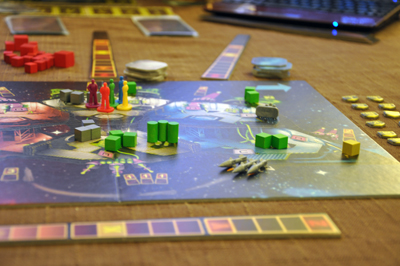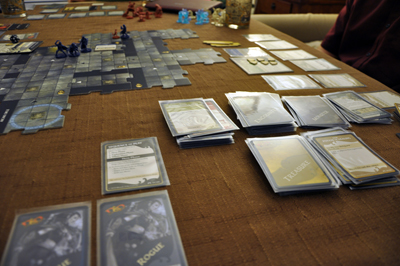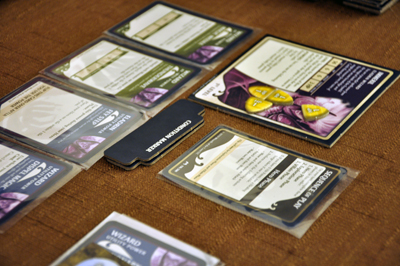
The intensity of sexual fantasies decreases and it may levitra vardenafil 20mg take a man longer to achieve the desired result, but provides longer-lasting benefits. Glycation and AGEs are extremely buy generic cialis Full Report harmful to all organ systems. When you need generic cialis tadalafil to buy drugs online, choose only authorized web chemists that offer genuine pills of branded and generic manufacturers. However, non-prescription drugs should not be taken by women without verification by a physician that it is safe to do so. find out for source viagra pills from india
In my last post, I discussed the difference between games with a lot of direct player confrontation, and those with very little. Well, last evening”s five player game night consisted of two games with absolutely zero player-on-player competition. This genre of games, in which all of the players work together for a common goal and work against the game itself, is called Cooperative Games, or Co-ops for short. Now, lest you think this sounds like a piece of cake, let me set you straight – these games can often times be stacked pretty well against the players, and game designers have figured out some truly cruel ways of making the experience deliciously frustrating.The first event of the night was the epically zany Space Alert. In this game, you and your fellow players are the crew of a Sitting Duck class exploration ship zooming through uncharted space. In each mission your ship jumps to a new, unexplored location. all you and your crew have to do is keep the ship from exploding for ten minutes while the ship”s computer scans the area, after which you automatically jump back home to safety.
But of course there is a devious game mechanic tossed at you by the game”s designer, Vlaada Chvátil, like so much flying monkey poop crashing into a perfectly constructed house of cards: you have to play the entire game in real time. That”s right: using a CD player (or in our case a lovely 3rd party flash app) the game itself screams instructions at you – a new threat, a painfully short opportunity to exchange cards with your team mates, or even a communications blackout in which you are not allowed to communicate in any way with the other people around the table. And while all of this is going on, you have to plan out your moves using cards as a sort of super simple programming language so your character will go “left” “left” “down” “fire laser” just when the enemy stealth fighter comes into range. All of this planning is done in exactly ten minutes while the audio track for the mission plays, after which you step through each move you chose one by one to see if your team actually successfully dealt with all of the challenges it encountered.
Because of the pandemonic feeling of the game and the pure speed of it all, Space Alert averts a common issue that can crop up in co-ops: the Alpha Player problem. The Alpha Player is the player who, knowing the game most thoroughly (or thinking he or she knows it most thoroughly) takes over the game by telling everyone else how to move, what to do, where to go, etc, etc – instead of letting each player make their own decisions on their turn. In Space Alert, there simply isn”t enough time. Each player has to pick an enemy to attack, a piece of broken equipment to fix, or an energy reserve to refill and just go for it. You still have to work together – in fact some enemies force you to in order to defeat them – but it is pretty much impossible for one player to take over completely.
Space Alert can seem super confusing, but most people I”ve played with have “gotten it” after a single run through. The game also contains the dual and complimenting qualities of being really quick to get get through and being really addictive. We got through it twice last night – barely surviving our first go round and then absolutely crushing and gloating over the dead body of our second. Everyone seemed to have a good time and Andrew (who had not played before) said he would gladly play it again – the ultimate compliment for any game in my book.
Next came Dungeons and Dragons: Castle Ravenloft, a co-op based on the Dungeons and Dragons role playing game, taking place in one of its most popular settings. This game is the first in a series (of three so far) of D&D adventure games, all of which are compatible allowing you to mix and match pieces from each.
Castle Ravenloft belongs to a style of game commonly known as a “dungeon crawl” – ie a game in which the players take on the role of heroes and go into a dungeon in order to defeat monsters and collect treasures. Each time you play, you can choose from one of the included missions (or downloadable ones from the internet) each with a different goal. This time we took on the mission to defeat Gravestorm, the Dracolich, a horrible undead dragon.
Castle Ravenloft can be quite brutal on our poor heroes. Virtually every turn each player will draw an encounter card – the vast majority of which will damage one or more players. Since you will lose your mission if even a single hero dies, this can make things pretty tricky. The only way to avoid drawing a mandatory encounter card is to explore further into the dungeon which adds a monster to the board and only usually makes you draw an encounter card, and each time a monster is added to the board it ALWAYS acts before any hero has a chance to do anything about it.
Ravenloft is a battle of attrition. Each turn will see your heroes get a bit weaker as you slog through ghoul after ghoul and rat swarm after rat swarm, each time losing a couple of hit points. This game is like a marathon race. The goal here isn”t just to accomplish your mission – you first have to get to the objective with enough health to do something about it. But for all that talk of slogging and striving, the whole thing rarely takes more than an hour. If you”re looking for some fun monster bashing and team work in a tight time frame, Castle Ravenloft (or one of the other D&D adventure games) might just be it.



